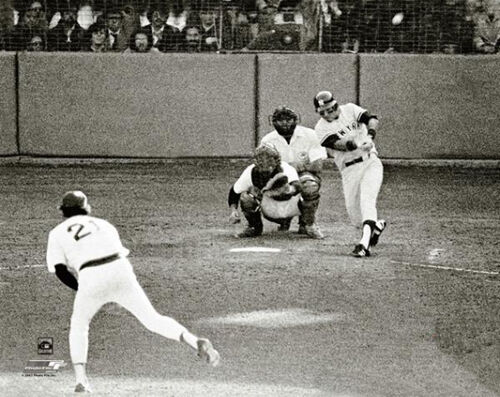I delivered this sermon in May, 2010. It connects the Torah portion, Bechukotai, to the death of a well known individual that had occurred earlier that week. I am posting it this week as we prepare to read Parashat Bechukotai this coming Shabbat.
Those of us who are fortunate enough to engage in professions which involve an endeavor about which we are passionate, often have, in our imagination, another profession that reflects one of our other interests. I certainly do. In that parallel universe of our imagination, I am a baseball radio announcer.
My station has only an audience of one (unless one of my kids or one of our animals comes into the room where I am watching a game) but that doesn’t matter. I can’t watch a game without broadcasting it.
If you’re a baseball fan, especially if you remember baseball on the radio, it’s hard to think of the great plays of baseball history without hearing the voice of the announcer who made the play come alive. When you think of Bobby Thompson’s home run, you hear Russ Hodges screaming: “The Giants win the Pennant.” When you see a tape of Kirk Gibson’s home run in the 1988 World Series, you can always hear Vin Scully exclaiming: “She is gone!” or Jack Buck saying; “I can’t believe what I just saw”. L’havdeel, to make a separation, the great baseball calls are like the Trop of the Torah reading, the chanting which accompanies the text.
The trop makes the Torah come alive and becomes the sound which we associate with the text. Let me give one clear example. As the Torah introduces the character of Noah and seeks to separate him from his evil generation, the reader chants one word with the slow, dramatic and majestic note called Zakef Gadol: V’NOACH matza hayn, And NOAH found favor in the eyes of God. It is not enough to read that line. If you are a Torah reader or familiar with Torah cantillation, you have to hear the line in your head as you read it.
We lost a great baseball announcer this week. I don’t have a personal nostalgic connection to Ernie Harwell but for those who do, his was the voice of their youth who brought the Detroit Tigers games to life with his own interpretive twist. Even those of us who don’t share that experience know that he was so very, very good at his craft. And, he was more than an announcer, he was the voice of a city, and a region, often struggling with adversity. He believed in Detroit and in Michigan and he went to bat for the city and the state time and time again. In every aspect of his life, he urged us not to live life like the batter who took a third strike, namely by “standing there like the house by the side of the road” but to embrace life to the fullest. He lived a full life before his death at age 92.
Ernie Harwell’s voice will continue to echo as will his written words including this thought which will help elucidate a point from today’s Torah portion. Harwell wrote: “Baseball is continuity. Pitch to pitch. Inning to inning. Game to game. Series to series. Season to season.”
“Season to Season”. When I was a kid, there were really only two seasons: “baseball season” and “not baseball season”. And, in fact, it could be said about these seasons that “never the twain shall meet”. For until the first pitch was thrown on Opening Day, there was very little to talk about baseball-wise. Yes, there were baseball cards that came out in March and news of a stray trade or signing during the winter but, in general, from the end of the world series until that first cold day in April when they opened up the ball park for the first time, there wasn’t much in the way of baseball. What there was was anticipation.
Now it’s different. Now, the MLB network shows classic and not so classic games in January, the Free Agent Market gets hot in December and exhibition games are shown throughout the end of February and March. Yes, there is now only one season. And while baseball fans like me might like it that way, we are definitely missing something.
We are missing the recognition of the change of seasons.
It was in that different world of 30 or 40 years ago that one Ernie Harwell tradition had great meaning. He would begin each season’s opening broadcast by reading a verse from Shir HaShirim, the Song of Songs: “For lo the winter has passed, the rains are gone and the sound of the turtle dove is heard in our land”. In Ernie Harwell’s context, it meant that the off season had passed and the new season begun.
The winter rains are gone. It is not their season. It was time for baseball and summer at last.
Parshat Behukotai features an idea which is found again and again throughout the Torah. The idea is that rain is a symbol of blessing from God. For an agricultural people, nothing else would be expected. But, the Torah always qualifies the promise of rain by saying that the blessing comes in the form of “rain in its season”.
This makes perfect sense for Israel and any part of the world where the seasons are distinct much like the baseball world I grew up in. In Israel, there is a rainy season and a dry season. A drought in the rainy season or rain in the dry season is a catastrophe and was always interpreted as a punishment from God for failure to observe the covenant. Thus, it was not enough to promise rain, the rain had to be promised “in its season” for it to be a blessing.
In Behukotai, we read: “v’natati gishmeychem b’itam”, I will give your rain in its season. But, as our people spread throughout the world into different types of climate, it became more difficult to interpret this phrase since it is meaningless to those where rain would fall throughout the year. How, might we understand the promise of “rain in its season” in our personal lives if each season brings rain?
Let me share with you one commentary on this phrase. The “rain in its season” was interpreted to mean, “I will bring rain when it is most convenient”. The commentary teaches that if you observe the commandments, it will only rain at a time when you are planning to be home anyway, namely, according to this teaching, on Friday night. Where else is a person but at home at the Shabbat table on Friday night? So, let it rain all it wants. That is, said this commentary, the meaning of rain in its season: rain when it will have the least negative impact.
I find this to be a charming and insightful commentary because of a subtlety that I find most meaningful. The commentary is not saying that God will make it rain so that you want to stay home on Friday night and while you’re at home you might as well have a nice Shabbat dinner. The world doesn’t work that way. The outside world doesn’t always make it easy for us to fulfill our obligations. We have to make the decision of how to observe time in the world and this verse says that once we have established such a routine, we will find less opposition from the outside world, in fact we’ll find somehow the world will make it easier for us to continue to observe.
Even this, of course, is not the reality. No matter how much we might value and hallow our routine, the world isn’t always sensitive to it and sometimes we face challenges and sometimes, inevitably, we find ourselves compromising. But, the principle still holds that we must establish our routines in a world which wants to see one day just like the other, in a world which is not divided so clearly into seasons. We must somehow carve out for ourselves meaning in such a world.
This is one of the gifts that Judaism provides for us. Each day is not like the rest. There is anticipation, each week towards Shabbat, each year towards Rosh Hashana, counting the days of the Omer leading up to Shavuot. Our Jewish calendar has happy times and sad times, seasons with many holidays, seasons with no holidays. There is no attempt to make each day like the one before. Instead, we talk about the seasons as if they really mean something, even if meteorologically the differences aren’t as stark as they are in Israel.
Kohelet teachers: there is a time for everything under the sun: a time to be born and a time to die, a time to rejoice and a time to weep. Our lives aren’t divided as evenly as Kohelet suggests. But, it is refreshing to think about seasons as if they actually do exist.
Our Jewish calendar and our observances allow us to recapture a sense of a year divided into seasons, something which in so many ways more than baseball, we have lost the desire to embrace. We adapt the weather to make our lives comfortable inside. We work through the summer as if to take a break would be to intrude on our professional lives.
We have to break out of this passion to blur the seasons. If in no other way than by sitting down at the Shabbat table each Friday evening, regardless of the weather, we are hearkening back to a time when everything had its place and we felt that each day and each time was distinctly different and each day held its own unique promise.
Thus, we can put, our own personal commentary on the way the world works and become accustomed to seeing the playing fields of our lives through the voice that tells us that each day is unique.


